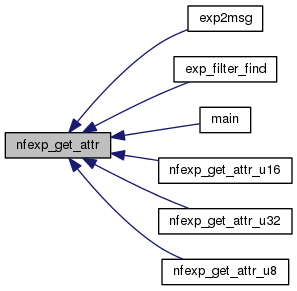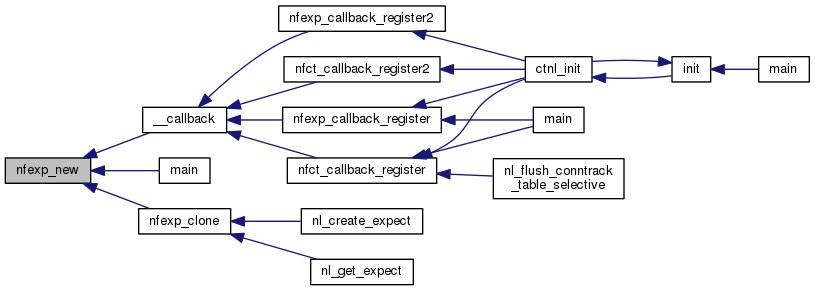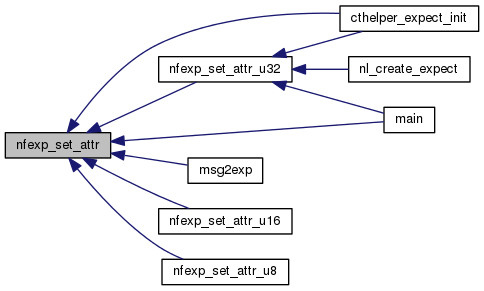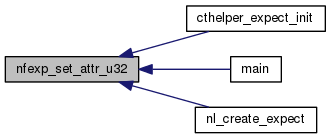Functions | |
| struct nf_expect * | nfexp_new (void) |
| nfexp_new - allocate a new expectation More... | |
| void | nfexp_destroy (struct nf_expect *exp) |
| nfexp_destroy - release an expectation object More... | |
| size_t | nfexp_sizeof (const struct nf_expect *exp) |
| nfexp_sizeof - return the size in bytes of a certain expect object More... | |
| size_t | nfexp_maxsize (void) |
| nfexp_maxsize - return the maximum size in bytes of a expect object More... | |
| struct nf_expect * | nfexp_clone (const struct nf_expect *exp) |
| nfexp_clone - clone a expectation object More... | |
| int | nfexp_cmp (const struct nf_expect *exp1, const struct nf_expect *exp2, unsigned int flags) |
| nfexp_cmp - compare two expectation objects More... | |
| void | nfexp_set_attr (struct nf_expect *exp, const enum nf_expect_attr type, const void *value) |
| nfexp_set_attr - set the value of a certain expect attribute More... | |
| void | nfexp_set_attr_u8 (struct nf_expect *exp, const enum nf_expect_attr type, u_int8_t value) |
| nfexp_set_attr_u8 - set the value of a certain expect attribute More... | |
| void | nfexp_set_attr_u16 (struct nf_expect *exp, const enum nf_expect_attr type, u_int16_t value) |
| nfexp_set_attr_u16 - set the value of a certain expect attribute More... | |
| void | nfexp_set_attr_u32 (struct nf_expect *exp, const enum nf_expect_attr type, u_int32_t value) |
| nfexp_set_attr_u32 - set the value of a certain expect attribute More... | |
| const void * | nfexp_get_attr (const struct nf_expect *exp, const enum nf_expect_attr type) |
| nfexp_get_attr - get an expect attribute More... | |
| u_int8_t | nfexp_get_attr_u8 (const struct nf_expect *exp, const enum nf_expect_attr type) |
| nfexp_get_attr_u8 - get attribute of unsigned 8-bits long More... | |
| u_int16_t | nfexp_get_attr_u16 (const struct nf_expect *exp, const enum nf_expect_attr type) |
| nfexp_get_attr_u16 - get attribute of unsigned 16-bits long More... | |
| u_int32_t | nfexp_get_attr_u32 (const struct nf_expect *exp, const enum nf_expect_attr type) |
| nfexp_get_attr_u32 - get attribute of unsigned 32-bits long More... | |
| int | nfexp_attr_is_set (const struct nf_expect *exp, const enum nf_expect_attr type) |
| nfexp_attr_is_set - check if a certain attribute is set More... | |
| int | nfexp_attr_unset (struct nf_expect *exp, const enum nf_expect_attr type) |
| nfexp_attr_unset - unset a certain attribute More... | |
| int | nfexp_snprintf (char *buf, unsigned int size, const struct nf_expect *exp, unsigned int msg_type, unsigned int out_type, unsigned int flags) |
| nfexp_snprintf - print a conntrack object to a buffer More... | |
| int nfexp_attr_is_set | ( | const struct nf_expect * | exp, |
| const enum nf_expect_attr | type | ||
| ) |
nfexp_attr_is_set - check if a certain attribute is set
| exp | pointer to a valid expectation object |
| type | attribute type |
On error, -1 is returned and errno is set appropiately, otherwise the value of the attribute is returned.
References ATTR_EXP_MAX, NULL, and nf_expect::set.
Referenced by exp2msg(), and exp_filter_find().

| int nfexp_attr_unset | ( | struct nf_expect * | exp, |
| const enum nf_expect_attr | type | ||
| ) |
nfexp_attr_unset - unset a certain attribute
| type | attribute type |
| exp | pointer to a valid expectation object |
On error, -1 is returned and errno is set appropiately, otherwise 0 is returned.
References ATTR_EXP_MAX, NULL, and nf_expect::set.
nfexp_clone - clone a expectation object
| exp | pointer to a valid expectation object |
On error, NULL is returned and errno is appropiately set. Otherwise, a valid pointer to the clone expect is returned.
References nfexp_new(), and NULL.
Referenced by nl_create_expect(), and nl_get_expect().


nfexp_cmp - compare two expectation objects
| exp1 | pointer to a valid expectation object |
| exp2 | pointer to a valid expectation object |
| flags | flags |
This function only compare attribute set in both objects, by default the comparison is not strict, ie. if a certain attribute is not set in one of the objects, then such attribute is not used in the comparison. If you want more strict comparisons, you can use the appropriate flags to modify this behaviour (see NFCT_CMP_STRICT and NFCT_CMP_MASK).
The available flags are:
Other existing flags that are used by nfct_cmp() are ignored.
If both conntrack object are equal, this function returns 1, otherwise 0 is returned.
References __cmp_expect(), and NULL.

nfexp_destroy - release an expectation object
| exp | pointer to the expectation object |
References NULL.
Referenced by __callback(), main(), nl_create_expect(), and nl_get_expect().

| const void* nfexp_get_attr | ( | const struct nf_expect * | exp, |
| const enum nf_expect_attr | type | ||
| ) |
nfexp_get_attr - get an expect attribute
| exp | pointer to a valid expect |
| type | attribute type |
In case of success a valid pointer to the attribute requested is returned, on error NULL is returned and errno is set appropiately.
References ATTR_EXP_MAX, exp, get_exp_attr_array, NULL, nf_expect::set, and type.
Referenced by exp2msg(), exp_filter_find(), main(), nfexp_get_attr_u16(), nfexp_get_attr_u32(), and nfexp_get_attr_u8().

| u_int16_t nfexp_get_attr_u16 | ( | const struct nf_expect * | exp, |
| const enum nf_expect_attr | type | ||
| ) |
nfexp_get_attr_u16 - get attribute of unsigned 16-bits long
| exp | pointer to a valid expectation |
| type | attribute type |
Returns the value of the requested attribute, if the attribute is not set, 0 is returned. In order to check if the attribute is set or not, use nfexp_attr_is_set.
References nfexp_get_attr(), and NULL.

| u_int32_t nfexp_get_attr_u32 | ( | const struct nf_expect * | exp, |
| const enum nf_expect_attr | type | ||
| ) |
nfexp_get_attr_u32 - get attribute of unsigned 32-bits long
| exp | pointer to a valid expectation |
| type | attribute type |
Returns the value of the requested attribute, if the attribute is not set, 0 is returned. In order to check if the attribute is set or not, use nfexp_attr_is_set.
References nfexp_get_attr(), and NULL.

| u_int8_t nfexp_get_attr_u8 | ( | const struct nf_expect * | exp, |
| const enum nf_expect_attr | type | ||
| ) |
nfexp_get_attr_u8 - get attribute of unsigned 8-bits long
| exp | pointer to a valid expectation |
| type | attribute type |
Returns the value of the requested attribute, if the attribute is not set, 0 is returned. In order to check if the attribute is set or not, use nfexp_attr_is_set.
References nfexp_get_attr(), and NULL.

| size_t nfexp_maxsize | ( | void | ) |
nfexp_maxsize - return the maximum size in bytes of a expect object
Use this function if you want to allocate a expect object in the stack instead of the heap. For example:
char buf[nfexp_maxsize()]; struct nf_expect *exp = (struct nf_expect *) buf; memset(exp, 0, nfexp_maxsize());
Note: As for now this function returns the same size that nfexp_sizeof(exp) does although this could change in the future. Therefore, do not assume that nfexp_sizeof(exp) == nfexp_maxsize().
nfexp_new - allocate a new expectation
In case of success, this function returns a valid pointer to a memory blob, otherwise NULL is returned and errno is set appropiately.
Referenced by __callback(), main(), and nfexp_clone().

| void nfexp_set_attr | ( | struct nf_expect * | exp, |
| const enum nf_expect_attr | type, | ||
| const void * | value | ||
| ) |
nfexp_set_attr - set the value of a certain expect attribute
| exp | pointer to a valid expect |
| type | attribute type |
| value | pointer to the attribute value |
Note that certain attributes are unsettable:
References ATTR_EXP_MAX, exp, NULL, set_exp_attr_array, type, and value.
Referenced by cthelper_expect_init(), main(), msg2exp(), nfexp_set_attr_u16(), nfexp_set_attr_u32(), and nfexp_set_attr_u8().

| void nfexp_set_attr_u16 | ( | struct nf_expect * | exp, |
| const enum nf_expect_attr | type, | ||
| u_int16_t | value | ||
| ) |
nfexp_set_attr_u16 - set the value of a certain expect attribute
| exp | pointer to a valid expect |
| type | attribute type |
| value | unsigned 16 bits attribute value |
References nfexp_set_attr().

| void nfexp_set_attr_u32 | ( | struct nf_expect * | exp, |
| const enum nf_expect_attr | type, | ||
| u_int32_t | value | ||
| ) |
nfexp_set_attr_u32 - set the value of a certain expect attribute
| exp | pointer to a valid expect |
| type | attribute type |
| value | unsigned 32 bits attribute value |
References nfexp_set_attr().
Referenced by cthelper_expect_init(), main(), and nl_create_expect().


| void nfexp_set_attr_u8 | ( | struct nf_expect * | exp, |
| const enum nf_expect_attr | type, | ||
| u_int8_t | value | ||
| ) |
nfexp_set_attr_u8 - set the value of a certain expect attribute
| exp | pointer to a valid expect |
| type | attribute type |
| value | unsigned 8 bits attribute value |
References nfexp_set_attr().

nfexp_sizeof - return the size in bytes of a certain expect object
| exp | pointer to the expect object |
References NULL.
| int nfexp_snprintf | ( | char * | buf, |
| unsigned int | size, | ||
| const struct nf_expect * | exp, | ||
| unsigned int | msg_type, | ||
| unsigned int | out_type, | ||
| unsigned int | flags | ||
| ) |
nfexp_snprintf - print a conntrack object to a buffer
| buf | buffer used to build the printable conntrack |
| size | size of the buffer |
| exp | pointer to a valid expectation object |
| message_type | print message type (NFEXP_T_UNKNOWN, NFEXP_T_NEW,...) |
| output_type | print type (NFEXP_O_DEFAULT, NFEXP_O_XML, ...) |
| flags | extra flags for the output type (NFEXP_OF_LAYER3) |
If you are listening to events, probably you want to display the message type as well. In that case, set the message type parameter to any of the known existing types, ie. NFEXP_T_NEW, NFEXP_T_UPDATE, NFEXP_T_DESTROY. If you pass NFEXP_T_UNKNOWN, the message type will not be output.
Currently, the output available are:
The output flags are:
On error, -1 is returned and errno is set appropiately. Otherwise, 0 is returned.
References __snprintf_expect(), and NULL.
Referenced by dlog_exp().

